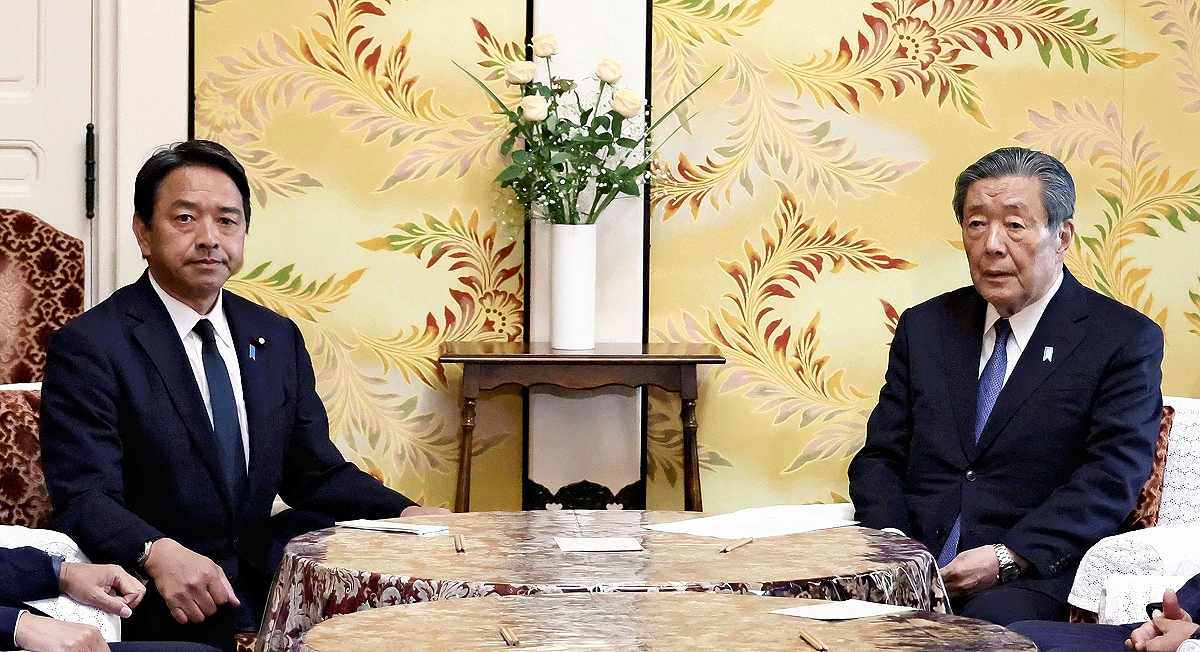LDP Walking Tightrope as It Seeks ‘Partial Coalition’ with Opposition DPFP; ‘¥1.03 million Barrier’ Key to Talks

Liberal Democratic Party Secretary General Hiroshi Moriyama, right, and Democratic Party for the People Secretary General Kazuya Shinba attend a meeting in the Diet Building in Tokyo on Thursday.
15:56 JST, November 1, 2024
The Liberal Democratic Party faces a delicate balancing act as it enters policy talks with the opposition Democratic Party for the People, with failure to satisfy the DPFP’s demands likely to cause the smaller party to pull the rug out from under the ruling bloc.
LDP and DPFP executives agreed Thursday to begin discussions on individual policies. While this agreement marked a first step toward the LDP gaining the DPFP’s cooperation in keeping Diet proceedings moving, the time available for these discussions is limited. And LDP efforts to lure the DPFP into a “partial coalition” together with current coalition partner Komeito are expected to be fraught with political danger.
The government and the LDP are extremely concerned that the DPFP could side with other opposition parties and topple the Cabinet of Prime Minister Shigeru Ishiba if its key policies are not adopted.
After meeting with DPFP Secretary General Kazuya Shinba on Thursday, LDP Secretary General Hiroshi Moriyama instructed LDP Policy Research Council Chairperson Itsunori Onodera to arrange a meeting between Ishiba and DPFP leader Yuichiro Tamaki.
“We’re hoping those talks will go ahead, even if they’re on Saturday or Sunday,” Moriyama told reporters after his talks with Shinba. “I want a schedule prepared quickly.”
The ruling parties are considering holding policy discussions and including the DPFP’s policies in the government’s economic package that will be finalized as soon as mid-November, in a bid to get the DPFP’s support for passage of a fiscal 2024 supplementary budget during the extraordinary Diet session in December. The ruling parties need the DPFP’s support after losing their majority in last month’s House of Representatives election.
Tamaki has indicated that following through with his party’s signature policies will be a priority. These policies include eliminating the “¥1.03 million barrier,” or the income threshold at which a worker’s take-home pay paradoxically falls if their income rises beyond that level, due to income tax kicking in, and lifting the freeze on the so-called trigger clause to enable a temporary gasoline tax cut.
“Discussions on the supplementary budget will come first, but it will be difficult to support that budget if we can’t see any clear direction on tax reform at the same time,” Tamaki said at a press conference Thursday. The DPFP expects that policies to address the “¥1.03 million barrier” and the trigger clause will be reflected in tax reform proposals to be compiled in December. Tamaki hinted that discussions could be halted if there was no broad agreement on the direction to take by around mid-November.
The DPFP has advocated raising the standard deduction for taxable income as one way to eliminate the “¥1.03 million barrier.” However, there are still many obstacles to such a policy change. “The central and regional governments would be forecast to lose about ¥7 trillion to ¥8 trillion in revenue, and the benefits of such a change would be larger the more income you have,” Chief Cabinet Secretary Yoshimasa Hayashi said at a press conference Thursday.
However, if the policy discussions fall apart, there is a strong chance the DPFP could throw its support behind a no-confidence motion against the Cabinet, which would make keeping the administration afloat very difficult. “Our only option is to continue coordinating [with the DPFP] on a case-by-case basis, so they won’t support a no-confidence motion,” a government official said.
Some in the LDP think the party should also reach out to the Japan Innovation Party. However, the JIP is in disarray after its poor performance in the lower house election, with some members even calling for the party’s leader, Nobuyuki Baba, to take responsibility for the results. As things stand, the LDP has not taken any concrete steps toward seeking cooperation from the JIP.
The DPFP is poised to start making more forceful demands for political reform from the LDP. On Thursday, the LDP’s headquarters for political reform confirmed a plan to have ruling and opposition parties agree to abolish political activity funds, which political parties give to their Diet members, during the extraordinary Diet session. The LDP also confirmed a plan to get them to agree to establish a third-party entity that would monitor political funds. The DPFP has been calling for such a third-party body to be set up during the current fiscal year, which runs through the end of March.
“Sorting that out during the extraordinary Diet session is the only way to meet our deadline,” a senior LDP official said.
Top Articles in Politics
-

Japan PM Takaichi’s Cabinet Resigns en Masse
-

Sanae Takaichi Elected Prime Minister of Japan; Keeps All Cabinet Appointees from Previous Term
-

Japan’s Govt to Submit Road Map for Growth Strategy in March, PM Takaichi to Announce in Upcoming Policy Speech
-

LDP Wins Historic Landslide Victory
-

LDP Wins Landslide Victory, Secures Single-party Majority; Ruling Coalition with JIP Poised to Secure Over 300 seats (UPDATE 1)
JN ACCESS RANKING
-

Producer Behind Pop Group XG Arrested for Cocaine Possession
-

Japan PM Takaichi’s Cabinet Resigns en Masse
-

Japan Institute to Use Domestic Commercial Optical Lattice Clock to Set Japan Standard Time
-

Man Infected with Measles Reportedly Dined at Restaurant in Tokyo Station
-

Israeli Ambassador to Japan Speaks about Japan’s Role in the Reconstruction of Gaza





















